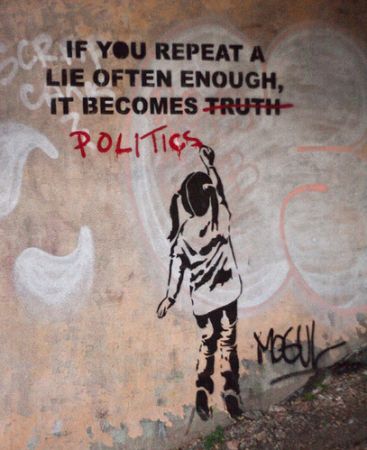A reminder to look beyond the smokescreen of propaganda when casting a vote.
How do you decide on which political party to vote for during the election? Do you evaluate the performance of a particular party based on what you have witnessed on the television or the headlines of a newspaper? Do you vote for a party because of your own self-interest? We all have different reasons why we vote for a party, but most of the time, most people tend to judge a political party based on political propaganda and/or political campaigns polluting our media rampantly. It is an unhealthy mindset but no one can help it. If this is going to continue in our society, we will not be politically matured enough to exercise our right to vote.
Political propaganda or campaign is a package of extra information that adds no significant value to our decision on which political party to support (or not to support). The information attached to the propaganda or campaign serves to overload our information processing system because our mind works in a way that generally seeks more data to support our decision. When digesting such information, we assume that the extra information is useful in helping us in pick our choice. Such a tactic can be easily seen in almost every political propaganda or campaign. This is especially when a person condemns another party but does not promote his own. One primary example is when a political party accuses its opponent of a sexual scandal. This sensational news only imposes negativity on the politician’s moral value and creates hype to force a politician to resign. The truth is, such sex scandals affects his or her leadership very little, or in many cases it doesn’t affect his political work at all. Self-explanatory examples can be seen from Bill Clinton’s scandal with Monica Lewinsky, or Chua Soi Lek’s.
Our society is unique in a way that we are segregated by race but still function as one. In an anthropologist point of view, despite growing up in a community of different groups, we tend to stick to our own type. For example we are closer to people that speak the same language, or practice the same culture. When such a bond is created, we tend to adopt the same way of thinking because one person’s decision will influence the other.
Very briefly, let’s say my neighbour installs a security system at home. People staying within that vicinity will also be persuaded to own a security system in their own house. Eventually I will have my own too. In a homogenous community, such as a community comprising those of the same religion, race or beliefs, political propaganda or campaigns often garner the best engagement. In many ways, the group is influenced by social dynamics. They exercise their group rules in order to maintain their community cohesion. When a propaganda or campaign penetrates into the community, they tend to accept the inferences that fit into their system of beliefs without challenge. They do not take much into consideration to ponder about the issues in question. Likewise, they will also reject any conclusion that doesn’t fit in their system of beliefs regardless of how beneficial it is to their individual interest. For instance, PAS is very influential in the East Coast. As the majority there are Muslims, they believe that Islamic theories best reach out to their political needs.
The next time you cast your ballot, make sure you think logically. Ask yourself what changes you want for your country, and then evaluate which political party or leader is likely to bring those changes you hope for. It is important not get influenced by unnecessary media coverage because it serves no purpose in making your decision.

